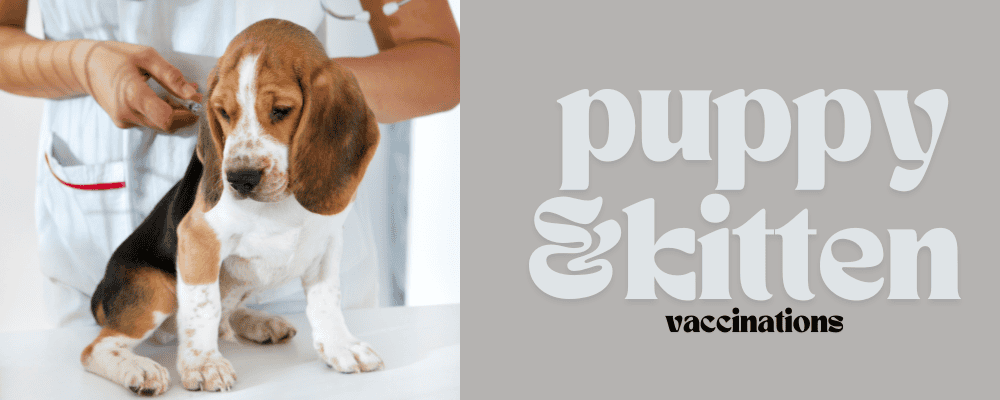Our puppy and kitten packages are specially designed to give your precious new pet all the essential checkups and preventative treatments that it needs, and to give you all the education that you need to give it the very best start in life – and to grow up happy and healthy.
Preventative care is an essential part of maintaining your pet’s health and well-being and keeps it safe from deadly (and costly) diseases. Below are our recommendations for your puppy’s or kittens first year.
Physical Exams: Your puppy’s or kitten’s lifetime of wellness starts with its first comprehensive physical exam. Puppies and kittens should have an exam every 4 weeks until it is at least 16 weeks of age. These visits are important because things can change rapidly, and these visits give our veterinarians an opportunity to assess your pet’s overall health, administer vaccines and deworming treatments, and to answer your pet care questions.
Vaccinations: Due to their immature immune systems, puppies and kittens must receive a series of properly staged vaccines in order to build up immunity to common contagious and deadly diseases. Since every puppy and kitten is unique, we tailor our vaccination recommendations based on their lifestyle and/or risk.
- Distemper– Canine distemper is a highly contagious, often fatal disease caused by a virus that attacks the respiratory, gastrointestinal, and the nervous systems. Distemper can be spread through contact with bodily secretions (e.g. nasal discharge), but is most commonly spread through airborne transmission (e.g. sneezing and coughing).
- Parvovirus– Canine parvovirus (CPV) is highly contagious and attacks the gastrointestinal tract of puppies and dogs. CPV is one of the most common infectious diseases of dogs. Death can occur as early as 2 days after the onset of illness. CPV is one of the most resistant viruses to infect dogs and can remain viable in the environment for extended periods of time. CPV is transmitted by direct contact or contact with contaminated feces or environments. The virus also spreads through contaminated surfaces, food and water bowls, collars, leashes, and the hands and clothing of people who touch a CPV–infected dog.
- Rhinotracheitis – Feline rhinotracheitis is a respiratory disease caused by feline herpesvirus-1. “Rhinotracheitis” means inflammation of the nose and windpipe, or trachea. Herpesvirus-1 also affects the reproductive tract and can cause problems during pregnancy. Feline herpesvirus type 1 is responsible for 80% to 90% of infectious feline upper respiratory diseases. Feline rhinotracheitis is spread between cats through direct contact with the eyes or nose of an infected cat or through contaminated objects, such as food and water bowls.
- Panleukopenia – Feline panleukopenia (sometimes called feline distemper) is a highly contagious, severe infection that causes gastrointestinal, immune system, and nervous system disease. “Panleukopenia” means a decrease in the number of white blood cells and it is caused by a feline parvovirus that is very similar to the virus that causes parvovirus in dogs. Feline panleukopenia virus (FPV) can survive at room temperature for up to 1 year and is persistent in the environment. It can be transmitted directly between cats and through contact with objects such as shared food and water bowls, grooming items, etc. Infected pregnant queens can also pass FPV to their kittens. Humans can transmit FPV to cats through contact with hands, clothing, or shoes.
- Rabies – Rabies attacks the nervous system, with fatal results once clinical signs appear. Rabies is usually spread through saliva introduced into tissue from the bite of a rabid animal. It can also be spread if infected saliva enters the body through a cut or comes in contact with the eyes, nose, or mouth.
Diagnostic Testing: We recommend that puppies and kittens be tested for intestinal parasites at each visit as the evidence of worms and other parasites can appear at any time. We also recommend that kittens be tested for Feline Leukemia and Feline AIDS at their first visit, if not done previously.
Additional Recommendations: Your veterinarian will also discuss other services, such as spaying and neutering or microchipping that can lead to a longer and healthier life for your dog or cat.
